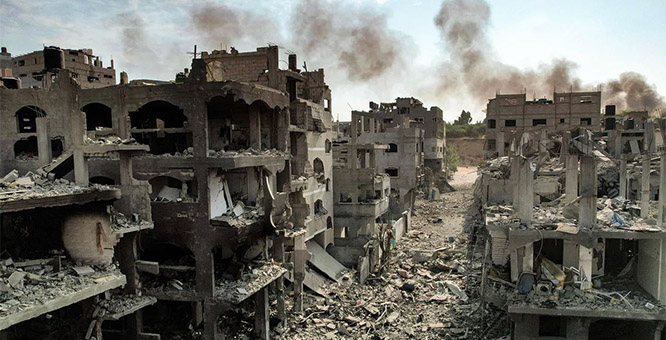Jeddah, Sep 28: The most watched debate in the history of US elections provided few clues to analysts and writers in the Arab world.
The marathon and raucous 90-minute verbal sparring between US presidential candidates Donald Trump and Hillary Clinton did not leave the Arab viewer any the wiser.

On some issues, Trump scored high marks and on others, Clinton was the clear winner.
Talking to Arab News on Tuesday, some of the top-ranked and established analysts, writers, columnists, observers, politicians and lobbyists were of the opinion that nobody had actually won or actually lost.
Hisham Melhem, former Washington, DC, bureau chief of Al Arabiya News Channel, felt Trump failed in style, form and content. “Hillary looked good, relaxed, comfortable and in full command of the facts,” he said. “Trump looked a little bit frazzled, especially in the second half of the debate. It was obvious that he was physically tired. He accused Clinton of lacking stamina, but in the end, it was he who seemed out of breath.”
One of the more disappointing aspects of the debate was the lack of any mention of Syria. “In that 90-minute discussion, Syria was never mentioned once,” rued Melhem. “Iran was discussed, Daesh was discussed but not Syria.”
According to Melhem, it was a stark failure by the two candidates. “It reflects the fact that neither of the two candidates has any workable plan to deal with Syria,” said Melhem.
On the issue of Iraq, Trump spoke against the American invasion, “but tried to hide the fact that he supported it early on and then changed his mind,” said Melhem.
On Iran, Trump did reiterate his opposition to the nuclear deal. “However, he did not reveal what he would do to cancel it, especially since the agreement is already being implemented, with the US releasing funds to Iran and Iran shutting down some of its nuclear facilities,” said Melhem. “Trump was very vague. He did not present any concrete plan for canceling the deal.”
As to who he thinks won, Melhem’s verdict was: “Hillary did a much, much better job. Trump’s performance was atrocious.”
Jamal Khashoggi, renowned Saudi columnist, was particularly taken aback by Trump’s assertion that Saudi Arabia, Japan and South Korea should pay for American protection.
“That is a very ambiguous statement,” he said. “What does he mean by that?”
He felt the Saudi government should come out with a statement explaining, “We do not have American protection” and “We do not have American bases here like they have in Japan and South Korea.”
According to Khashoggi, if Trump wants to deal with foreign policy issues as if he were doing a business deal, “Then that may sound offensive, but it is not a totally bad idea.”
“For instance, let us say hypothetically that Trump is the president and we want him to intervene in Syria, for example, and he puts his country on hire and demands $5 billion for the job; that is not bad,” explained Khashoggi. “We need clarity on this because he repeatedly said that America is suffering and that those countries whom it supports and provides protection need to pay.”
Khashoggi welcomed Trump’s criticism of Barack Obama’s foreign policies. “We, Saudis agree with his assessment, but then we don’t know what Trump is going to do about changing those policies.”
“Trump is very keen on fighting Daesh, which is good. But how is he going to do that?” he wondered. “Trump rightly pointed out the nuclear deal that Obama signed with Iran did not touch on issues such as Yemen. That is exactly our argument. Obama just concentrated on the nuclear deal and put aside Iran’s bad behavior in the region.”
Khashoggi said the worrying thing about Trump was his unpredictability.
His verdict: “Hillary outperformed Trump. She looked more presidential. If I were American, I would put my trust in her.”
Mishaal Al-Gergawi, managing director of the Abu Dhabi-based Delma Institute, was very surprised at how well Clinton did.
“I thought she would be put off by Trump. I thought Trump would behave a little more presidential because they say that candidates are more extreme during the primaries but once they win the nomination, they become moderate,” he said.
Al-Gergawi said something else worthy of thinking about. “We have had two very ideologically-driven administrations in the US — one led by George W. Bush and the other by Obama. We now need a predictable US president, a president whom we understand, and who will average out Bush and Obama. The problem with Trump is that we don’t understand him.”
His verdict: “I think Hillary won. She did well. She came out on top. She looked presidential. I want her to win.”
Salman Al-Ansari, founder and president of the Washington-based Saudi-American Public Relation Affairs Committee (SAPRAC), said the debate was more focused on domestic issues, “because their primary audience is the American public.”
“Yes, they did speak about security issues and combating terrorism, but it was very clear that their main focus is to turn the economy around and create jobs,” he said.
Al-Ansari was “a little bit concerned” about Trump’s statement that “Saudi Arabia needs to pay the US.”
“I am pretty sure that the moment he assumes office, he will realize that Saudi Arabia is actually a real partner that provides value to the United States,” he said.
His verdict: “Both of them did great. Nobody won and nobody lost.”
Khalil Shaheen, director of research and policies at the Palestinian Center for Policy Research and Strategic Studies (Masarat), said: “The Palestinians and the Arabs have to deal realistically with the results of the US election. Any expected change in US political stances will not stray from US vested interests.”
He said the Israeli reaction toward the two presidential candidates should pave the way for the Arabs in general and the Palestinians in particular to decide which of the two candidates better serves, or is more concerned with doing justice to, the Arab causes.
“For the Israelis, Trump is their favorite, especially after his dubious statements during his meeting with Netanyahu that he would recognize Jerusalem as the Israeli capital, and would work to move the US Embassy there,” he said.
His verdict: “Undecided.”
Daoud Kuttab, an award-winning Palestinian American journalist, said: “The United States is a world leader and it is of immense interest to everyone on the planet who will lead the world’s sole superpower. People around the world certainly want to be sure that the person in the White House is stable and not erratic. The 90-minute debate did little to explain the positions of the two candidates on foreign policy issues but it did show clearly that Clinton has a much stronger command of the issues and she has clearly done her homework on both local and international subjects.”
His opinion as to who won the debate: “Hillary Clinton.”
Nabil Al-Sharif, Jordan’s former minister of media affairs and communications, said: “The debate was mostly focused on the internal affairs that are of direct interest to the America voter. We, the Arabs, are part of this world and in light of the enormous developments taking place in our region, we are naturally concerned with the outcome of the US election.”
His verdict: “Trump appeared to be shallow and weak while Clinton sounded much stronger.”







Comments
Add new comment